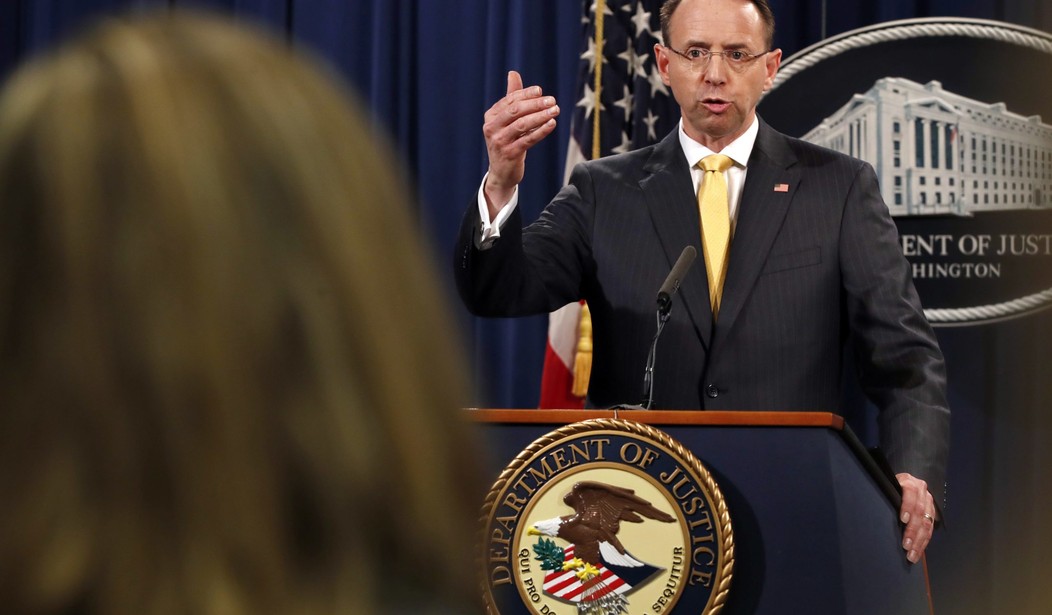WASHINGTON — A federal grand jury in the District of Columbia returned an indictment today against 13 Russian nationals accused of an elaborate campaign influence operation during the 2016 campaign season that included conspiracy with unnamed “persons known and unknown to the Grand Jury.”
All of the defendants are charged with conspiracy to defraud the United States, three are also charged with conspiracy to commit wire fraud and bank fraud, and five are charged with aggravated identity theft.
The case centers on the Internet Research Agency, “a Russian organization engaged in operations to interfere with elections and political processes.” According to the indictment, the accused worked beginning in around 2014 in an op to “defraud the United States by impairing, obstructing, and defeating the lawful functions of the government through fraud and deceit for the purpose of interfering with the U.S. political and electoral processes, including the presidential election of 2016.”
A dozen of the defendants worked for the agency, while the 13th, Yevgeny Viktorovich Prigozhin, is accused of funding the component of Project Lakhta through shell companies including Concord Management and Consulting, LLC, and Concord Catering. Hundreds of people worked with the Internet Research Agency, setting up fake online personalities, establishing social media accounts, optimizing their search engine results, creating propaganda graphics and more. They worked off of space purchased on computer servers in the United States, and at least two traveled to the U.S. “under false pretenses in order to collect intelligence for their interference operations.”
“They used stolen or fictitious American identities, fraudulent bank accounts and false identification documents. The defendants posed as politically and socially active Americans, advocating for and against particular candidates. They established social media pages and groups to communicate with unwitting Americans. They also purchased political advertisements on social media networks,” Deputy Attorney General Rod Rosenstein said today at a press conference.
“The Russians also recruited and paid real Americans to engage in political activities, promote political campaigns and stage political rallies,” he added. “The defendants and their co-conspirators pretended to be grassroots activists. According to the indictment, the Americans did not know that they were communicating with Russians.”
The indictment details these rallies, including a series of “Florida Goes Trump” rallies on Aug. 20, 2016. “Defendants and their co-conspirators asked one U.S. person to build a cage on a flatbed truck and another U.S. person to wear a costume portraying Clinton in a prison uniform. Defendants and their co-conspirators paid these individuals to complete the requests.”
After Trump won the election, “Defendants and their coconspirators used false U.S. personas to organize and coordinate U.S. political rallies in support of then president-elect Trump, while simultaneously using other false U.S. personas to organize and coordinate U.S. political rallies protesting the results of the 2016 U.S. presidential election.”
Rosenstein noted that after a Sept. 13 report about special counsel Robert Mueller investigating Russian social media influence operations, one defendant wrote, “We had a slight crisis here at work. The FBI busted our activity. So I got preoccupied with covering tracks together with my colleagues.”
Rosenstein confirmed that “the special counsel’s investigation is ongoing.”
“There will be no comments from the special counsel at this time,” he added. “This indictment serves as a reminder that people are not always who they appear to be on the internet. The indictment alleges that the Russian conspirators want to promote discord in the United States and undermine public confidence in democracy. We must not allow them to succeed.”
The deputy attorney general noted that there’s “no allegation in the indictment of any effect on the outcome of the election.”
The indictment charges that had the Russian group had “a strategic goal to sow discord in the U.S. political system, including the 2016 U.S. presidential election.”
“Defendants posted derogatory information about a number of candidates, and by early to mid-2016, Defendants’ operations included supporting the presidential campaign of then-candidate Donald J. Trump (‘Trump Campaign’) and disparaging Hillary Clinton,” the document continues. “…In order to carry out their activities to interfere in U.S. political and electoral processes without detection of their Russian affiliation, Defendants conspired to obstruct the lawful functions of the United States government through fraud and deceit, including by making expenditures in connection with the 2016 U.S. presidential election without proper regulatory disclosure; failing to register as foreign agents carrying out political activities within the United States; and obtaining visas through false and fraudulent statements.”
By September 2016, the project funding funneled into the Concord businesses was more than 73 million Russian rubles, or exceeding $1,250,000. About a million rubles were reserved for bonus payments.
To conceal payments, Concord labeled them as related to software support and development and distributed the funds through 14 bank accounts.
“By 2016, Defendants and their co-conspirators used their fictitious online personas to interfere with the 2016 U.S. presidential election. They engaged in operations primarily intended to communicate derogatory information about Hillary Clinton, to denigrate other candidates such as Ted Cruz and Marco Rubio, and to support Bernie Sanders and then-candidate Donald Trump,” states the indictment.
Employees of the Russia operation also got performance reviews. On Sept. 14, 2016, in regard to an Internet Research Agency-controlled Facebook group called “Secured Borders,” the account specialist “was criticized for having a ‘low number of posts dedicated to criticizing Hillary Clinton’ and was told ‘it is imperative to intensify criticizing Hillary Clinton’ in future posts.”
Materials produced by the operation about the 2016 U.S. presidential election used hashtags #Trump2016, #TrumpTrain, #MAGA, #IWontProtectHillary, and #Hillary4Prison, the indictment adds. “Defendants and their co-conspirators also established additional online social media accounts dedicated to the 2016 U.S. presidential election, including the Twitter account ‘March for Trump’ and Facebook accounts ‘Clinton FRAUDation’ and ‘Trumpsters United.’”









Join the conversation as a VIP Member